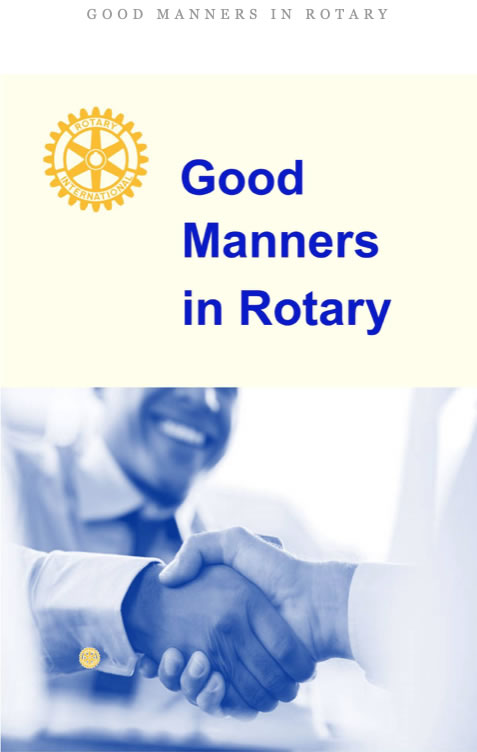Ethics and accountability
| Site: | Rotary District 9675 My Learning |
| Course: | Club management |
| Book: | Ethics and accountability |
| Printed by: | Guest user |
| Date: | Tuesday, 3 February 2026, 7:58 AM |
Description
Rotary has a long history of great work across the world. The material in this resource will help you to follow some simple guidelines when making decisions, conducting meetings and communicating with members and the community.
1. Overview
Ethics commonly refers to the rules and principles that define right and wrong conduct of individuals (Foundations of management / Stephen P. Robbins, Rolf Bergman, Ian Stagg, Mary Coulter 2003, p.150). Rotary has guiding principles that are based on ethical behaviour.
These principles have been developed over the years to provide Rotarians with a strong, common purpose and direction. They serve as a foundation for our relationships with each other and the action we take in the world.
Object of Rotary
The Object of Rotary is to encourage and foster the ideal of service as a basis of worthy enterprise and, in particular, to encourage and foster:
FIRST. The development of acquaintance as an opportunity for service;
SECOND. High ethical standards in business and professions, the recognition of the worthiness of all useful occupations, and the dignifying of each Rotarian’s occupation as an opportunity to serve society;
THIRD. The application of the ideal of service in each Rotarian’s personal, business, and community life;
FOURTH. The advancement of international understanding, goodwill, and peace through a world fellowship of business and professional persons united in the ideal of service.
Our Mission
The mission of Rotary International is to provide service to others, promote integrity, and advance world understanding, goodwill, and peace through its fellowship of business, professional, and community leaders.
Adapted from Rotary Club of Engadine accessed 22 April 2020. My Rotary Guiding principles.
2. 4-way test
The Four-Way Test is a nonpartisan and nonsectarian ethical guide for Rotarians to use for their personal and professional relationships. The test has been translated into more than 100 languages, and some clubs choose to recite it at club meetings:
Of the things we think, say or do
- Is it the TRUTH?
- Is it FAIR to all concerned?
- Will it build GOODWILL and BETTER FRIENDSHIPS?
- Will it be BENEFICIAL to all concerned?
3. Effective communication
Effective communication is defined as verbal speech or other methods of relaying information that get a point across. Effective communication is vital for clubs both within the club, in your community and to the wider environment.Let's first consider verbal communication. Being a President will require you to be able to communicate effectively. Watch the following TED talk by Celeste Heedlee on how to communication more effectively. Celeste makes some really great points.
Apart from verbal communication you need to consider written means of communication:
- having an agenda for all meetings to ensure you stay on track and address important issues
- how you will communicate with club members. Many clubs have a regular bulletin or newsletter to communicate with club members
- advertising club activities on a website and/or in social media
- circulating the District Governor's Newsletter and that of the District Secretary
- promoting the activities of Rotary International
- writing stories for the media about club activities.

4. Transparency in decision making
You may think that as President you have the overall right to make decisions, however, this ‘commander’ archetype of leadership is becoming less and less relevant in modern organisations. It is being replaced by a facilitative practice of leadership. Accountability and transparency are at the heart of effective governance, and effective governance is required to underpin the viability of your club.
Being transparent in your decision making will:
- foster a feeling of trust amongst members
- involve members in the decision making process
- empower members to feel that they have some control over the decision making process
- if a consensus is not reached, at least members will feel they have been part of the process and understand the outcome
- it shows a respect for minority views.
This type of openness between a President and members creates trust and leads to a successful club. Transparency is an ongoing process that can have ongoing results.
5. Good manners in Rotary
As John G. Thorne, Rotary International Past Directer says "...Without good manners, society would be a mess. Although Rotary is not a business, mostly we should do well by being 'business-like' and effective in the way we conduct our meetings and treat other people. Indeed, there can be personal advantages when we recognise good manners, etiquette or appropriate protocols in the right place or the right time."
Good manners in Rotary by John G. Thorne, Rotary International Past Director, is available online for a cost of $2.21 for a Kindle edition. This resource outlines many of the issues we have discussed in this topic on Governance. This publication may be of use to you and your club as a reference.

6. Following Rotary protocols
Protocol is what to do in a given situation. Etiquette is how to do it and how to do it gracefully.
This document contains suggested Protocols for:
- Club meetings
- Rotary innovations
- Introducing guests
- Visit by the District Governor
- Toast to Rotary International
- Visiting Rotarians and guests
- Rotary introductions protocol
- Induction of a new Rotarian
- Induction of a former Rotarian
- Awarding a Paul Harris Fellow
- Rotary badges
- Australian flag
- Email.